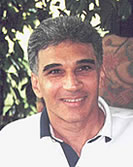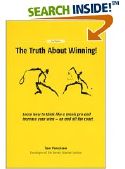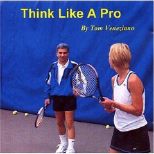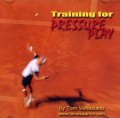 |  | 
| Welcome to the March 2019 update from Tennis Server, http://www.tennisserver.com/
Â
Greetings,
Â
In his March column, John Mills discusses how to teach a tennis student to help them reach their potential quickly. See: How - Not How Much.
Â
And in his column in this newsletter below, Tennis Warrior Tom Veneziano teaches us how a paradigm shift can lead to tennis improvement. See: "Have you had a paradigm shift yet?."
Â
Have fun on the court!
Â

Cliff Kurtzman
Publisher and Editor-in-Chief
Tennis Server
Â
Â
Please feel free to forward this newsletter to a friend, and suggest that they go to http://www.tennisserver.com/ to sign up for their own free subscription.
Â
We will miss you if you leave, but if you should decide that you no longer wish to receive this newsletter, just click here to unsubscribe.
Â
Â
The Tennis Warrior - Exclusive to Tennis Server Newsletter
Â

Tom Veneziano |
Â
The Tennis Warrior is brought to you by Tom Veneziano (tom@tennisserver.com). Tom is a tennis pro teaching at the Piney Point Racquet Club in Houston, Texas. Tom has taught thousands of players to think like a pro with his Tennis Warrior System.
Â
March 2019 -- Have you had a paradigm shift yet?
Â
One of my favorite word combinations is "paradigm shift." A paradigm is an example, pattern or model. When you have a paradigm shift you shift your reality in a certain pattern or model, dramatically changing what you formerly believed to be true. Many times a paradigm shift occurs when theoretical knowledge does not agree with application and experience.
Â
Years ago I had a paradigm shift in tennis. When I began teaching, I held preconceived ideas about learning and playing tennis that were based on traditional and accepted truths. Often, as I stood on the court giving lessons, I wondered "Why am I teaching my student this technique when I do not do it myself?" If I am playing a free-flowing, automatic, instinctive game, why am I teaching a rigid, robotic type of game with all this emphasis on technique? But I dismissed that doubt and kept teaching, figuring this is the way it is supposed to be done. I'm the pro, I reasoned. My students cannot do what I can, at least not yet.
Â
Then the next haunting dilemma popped into my mind. At what point do my students abandon this so-called correct way and begin playing the way I was playing? Exactly when will they be "ready" to play freely? Unable to come up with an answer, I began questioning the conventional wisdom and experimenting on my own.
Â
I remember one of my first breakthroughs. When my student hit a groundstroke and stumbled off balance I would usually say, "Try to stay still and balanced after the shot." Of course, when I played I didn't stay still and balanced. Instead I recovered to be ready for the next shot by jumping off the ground if necessary. This prompted me to experiment with my students. I had a hunch that if I said nothing when my students fell off balance, eventually their balance would improve by itself.
Â
Week after week I said nothing and watched, with growing astonishment, as my students slowly went from stumbling all over the place to a more controlled recovery. The very thing I tried to force them to learn was happening automatically through sheer repetition. Their body, being consistently challenged, was discovering its own balance.
Â
It seemed like a miraculous breakthrough at the time, but I soon realized that this follows exactly the same principle as learning to ride a bicycle. You simply fall off balance over and over again until your balance improves and you learn to ride. You do not learn to ride a bicycle by trying to stay still and balanced in one spot. In fact, it's funny to even think about it. Tennis is also a moving game. You do not efficiently learn balance by standing in one spot. From day one, you must allow yourself to fall off balance and practice recovering until your balance improves. It works!
Â
After this realization, I began challenging many of my conventional teaching methods and replacing them with more automatic, instinctive techniques that are the signature of a champion. My website, books, audio downloads and newsletters are all a result of that paradigm shift. With this column I want to encourage you to keep experimenting, explore new options and have your own paradigm shift. Many of you are already beginning to have this shift.
Â
Tennis is a magnificent game that anyone can play in an automatic, instinctive mode. Of course, this does not mean I am recommending sloppy tennis or the abandonment of all technique. Yes, learn some correct procedures, but also learn to let go mentally and play without overanalyzing every technical failure. Learn to play more automatically with the game you possess on any given day, even if it is not technically correct according to conventional wisdom. Try to break out of that confined box that conventional methods stuff you into. Reject the mentality that tends to make perfect conventional techniques the reason why you win.
Â
Psssst, here's a secret... world-class pros don't follow the conventional paradigm either. If a pro were to take a conventional lesson, he or she would be deemed incorrect in just about everything he or she does! Can't you just hear a conventional lesson given to a top pro: "You know, you have a few problems. Here is a list of some of them:
- You jump off the ground on most of your shots.
- You swing upward instead of outward.
- You hit entirely too much with an open stance.
- Your racket preparation is much too late.
- You are not staying still and balanced on each shot.
- You are definitely not staying down through the stroke.
- You are hitting too many times with your body weight moving backward.
- Your knees are not always bent.
- Your racket head drops below your wrist too many times.
- And you are rolling your wrist on your groundstrokes just about every time.
In short, you're a mess! I think you need about ten hours of lessons a week for the next year to straighten all of this out."
Â
To which Roger Federer would likely respond, "But I've won 20 Grand Slams!"
Â
Your Tennis Pro,
Â
Tom Veneziano
Â
Previous columns from Tom Veneziano are archived online in the Tennis Server's Tennis Warrior Archive six months after publication in this newsletter.
Â
Â
 Â Â  Â Â  Â Â 
Â
In Tom Veneziano's book "The Truth about Winning!", tennis players learn in a step-by-step fashion the thinking the pros have mastered to win! Tom takes you Step-by-step from basic mental toughness to advanced mental toughness. All skill levels can learn from this unique book from beginner to professional. No need to change your strokes just your thinking. Also available at a discount as an E-Book.
Â
Audio CDs by Tom Veneziano:
Â
Â
Â
Becoming a Tennis Server Sponsor/Advertiser
Â
Our readers continually tell us they are hungry for information on tennis-related products, equipment, tournaments, and travel opportunities. There is no better way to reach the avid online tennis audience than through the Tennis Server. For information on advertising through our web site or in this newsletter, please contact us by using this form or call us at (281) 480-6300.
Â
We have a variety of sponsorship programs available, and we can connect you with a highly targeted tennis audience at rates that are lower than many web sites charge for reaching a general audience.
Â
Â
Linking to the Tennis Server
Â

Â
We frequently receive requests from people for a graphic to use in linking from their site to the Tennis Server site. We've created a graphic at:
Â
Â
that you are welcome to use in conjunction with a link to http://www.tennisserver.com/. You are welcome to copy this graphic and use it on your site for this purpose. Please be sure to include an ALT tag with the graphic: ALT="Tennis Server".
Â
Â
Newsletter Ground Rules
Â
The Tennis Server and the Tennis Server Newsletter are copyrighted publications. "Tennis Server" is a registered trademark and "Center Court for Tennis on the Internet" is a trademark of Tennis Server. This newsletter, along with the editorial and photographs on the tennisserver.com web site, are copyrighted by Tennis Server and its contributors.
Â
Our newsletters cover updates to the Tennis Server and other tennis information of general interest. Mailings occur approximately once a month, usually by the end of the first weekend of the month. The newsletter sometimes contains commercial tennis-related content from Tennis Server sponsors.
Â
We keep the addresses of mailing list subscribers confidential. If someone asks us to distribute tennis- related materials to the mailing list, we might do so for them, and we might charge them for doing so if there is commercial content to the message.
Â
See you on the courts,
Â
--Cliff Kurtzman for Tennis Server
Â
|  |  |
|  |